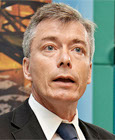
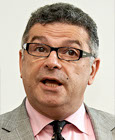



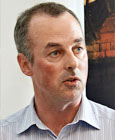
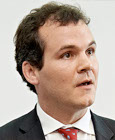

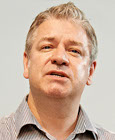

Securing Food & Water
28 June 2012
Cambridge Judge Business School, Cambridge
2012's CIBAM Symposium on 'Securing Food and Water' brought together leading business people, academics, policymakers and representatives of NGOs and international organisations to discuss the challenges presented by the uneven distribution of global resources, the increasing demand for food, and shortages of adequate, safe drinking water. Professor Sir Leszek Borysiewicz, Vice-Chancellor of the University of Cambridge, proposed the theme of the Symposium, which was endorsed unanimously by the CIBAM Advisory Board.
Food has become a driver of world politics. Soaring food prices are considered to be a major trigger for the riots that destabilised North Africa and the Middle East, beginning in December 2010 in Tunisia. Environmental factors related to global warming exacerbate the supply problem. Bad weather, such as this year's drought in East Africa, has had catastrophic human costs. These and other factors that contribute to the trend of increasing demand and decreasing ability to supply will be explored.
A related problem, water scarcity, already affects every continent and more than 40 per cent of the world's population. By 2025, 1.8 billion people are expected to be living in countries or regions with absolute water scarcity, and two-thirds of the world's population could be living under water-stressed conditions. The water scarcity situation is being exacerbated by climate change, especially in the driest areas of the world, which are home to more than two billion people and to half of all poor people
Welcome Addresses & Introductions
Professor Christoph Loch, Director, Cambridge Judge Business School
The CIBAM-Cambridge Judge Business Global Business Symposium started with Dr Christos Pitelis, Director of the Centre of International Business and Management (CIBAM), introducing Professor Christoph Loch, the Director of Cambridge Judge Business School. Dr Pitelis informed the attendees that, unfortunately, Professor Sir Leszek Borysiewicz, Vice-Chancellor of the University of Cambridge, would not be able to deliver the Academic Keynote Lecture due to a personal hardship, but added that Professor Loch would be covering some of the Vice-Chancellor's points too.
Dr Christos Pitelis, Director, Centre for International Business and Management
Dr Pitelis, Director of the Centre for International Business and Management (CIBAM), thanked Professor Loch for his welcome address and started his presentation by pointing to the 15 consecutive years of CIBAM Global Business Symposia, highlighting the relevance of this year's theme on "Securing Food and Water", which was recommended by the Vice-Chancellor Professor Sir Leszek Borysiewicz.
Commissioner Maria Damanaki, EU Commissioner on Maritime Affairs and Fisheries
Ms Maria Damanaki, EU Commissioner on Maritime Affairs and Fisheries, addressed the audience via video and spoke on the risks that the fish population is facing due to increases in population dynamics and fish consumption, but also due to over-exploitation of fish stocks by the fish industry. She expressed her firm belief that fish stocks would produce more if fished sustainably.
Business Keynote Lecture
Mr José Lopez, Executive Vice President of Operations, Nestlé
Securing food and water: a food industry perspective
After the video policy message, the floor was given to the Business Keynote Speaker Mr José Lopez, Executive Vice President, Operations & GLOBE of Nestlé, who introduced himself and explained his role. Mr Lopez briefly described the activities of the company that counts 150 years of history, operates 465 factories worldwide and employs 320,000 people..
Panel Discussion: Setting the Scene
Professor Noreena Hertz, Associate Director, Centre for International Business and Management (CIBAM)
Panel Chair
Following the coffee break, the first panel on "Setting the Scene" took place. Professor Noreena Hertz, Associate Director at the Centre for International Business and Management (CIBAM), chaired the panel and briefly introduced the three speakers.
Dr Mark Mulligan, Reader, King's College London, and Leader, Project AN3 of the CGIAR Challenge Programme on Water and Food
Global biophysical capacity for water and food production: status and trends
The first panellist, Dr Mark Mulligan, Reader at King's College London, focused primarily on biophysical aspects. In the beginning of the presentation, Dr Mulligan showed an impressive map that visualised changes in the footprint of agriculture in the world over time. The audience could easily see the growth of agriculture over time to feed an increasing world population. This has major implication on the use of water, as 70-90 per cent of water use is associated with agriculture. Dr Mulligan also showed a similar map, displaying the growth in the number of water dams over time. Recently, the number of dams over 15 metres increased to 36,000 worldwide, most of them used for agriculture.
Dr Mark Mulligan, Reader, King's College London, and Leader, Project AN3 of the CGIAR Challenge Programme on Water and Food
Global biophysical capacity for water and food production: status and trends
The final panellist, Mr Marc Zornes, Engagement Manager at McKinsey & Co., presented the main findings from an intensive study done within the Sustainability and Resource Productivity Practice at
Dr Mark Mulligan, Reader, King's College London, and Leader, Project AN3 of the CGIAR Challenge Programme on Water and Food
Global biophysical capacity for water and food production: status and trends
Panel chair
After the lunch break the second panel started. Mr Jack Keenan, Founder and CEO of Grand Cru Consulting and Patron of the Centre for International Business and Management (CIBAM), chaired the Panel and introduced the first speaker.
Mr Peter Madden, Chief Executive, Forum for the Future
Feeding future cities
Mr Peter Madden, CEO of the Forum for the Future, shared some basic information regarding the aims, scope and agenda of the Forum for the Future. Mr Madden's talk elaborated on the challenges that modern cities are expected to face during the coming years. The increase of the urban population will bring critical population pressures, with immediate effects on food and water consumption. The Food and Agriculture Organisation (FAO) forecasts a need of 70 per cent increase in food production, just in order to meet the pressing changes in demand.

CIBAM is a registered trademark of the Harry Hansen Research Fellowship Trust